Hyundai Ioniq (AE): Engine Electrical System / General safety information and caution
Precautions To Take Before Servicing High Voltage System
| •
| Since hybrid vehicles contain a high voltage battery, if the high voltage system or vehicles are handled incorrectly, this might lead to a serious accidents like electric shock and electric leakage. |
|
|
| •
| Be sure to shut off the high voltage by removing the safety plug before performing inspection or repairing the high voltage system. (Refer to Hybrid Control System - "High Voltage Shut-off Procedures") |
| •
| The responsible worker keeps the removed safety plug to prevent the plug from being connected by mistake. |
| •
| Do not keep any metal objects (watch, ring etc.) while working on the high voltage system, which it can cause serious accidents like electric shock. |
| •
| Before beginning work on the high voltage system, the worker should wear personal protective equipment to prevent safety accidents. (Refer to "Personal Protective Equipment") |
| •
| Never allow workers who are not wear personal protective equipment to touch the high voltage system. High voltage components should be covered with an insulation sheet to prevent safety accidents. |
| •
| Use insulation tools when working on the high voltage system. |
| •
| Put the removed high voltage components on the insulation mat. |
|
|
| •
| All the high voltage wiring and connectors are orange. |
| •
| A caution label for high voltage is attached to the high voltage components. |
| •
| High voltage components : High Voltage Battery Pack Assembly, Power Relay Assembly (PRA), BMS ECU, Hybrid Power Control Unit (HPCU), Hybrid Drive Motor, HSG, Electric A/C Compressor, Low DC/DC Converter (LDC), Power Cable, Electric Compressor etc. |
|
|
| •
| Inform of danger of high voltage by putting the "high voltage caution" on the vehicle as image below. |
|
|
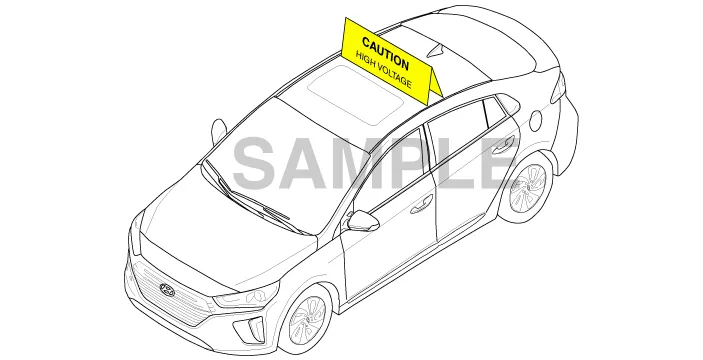
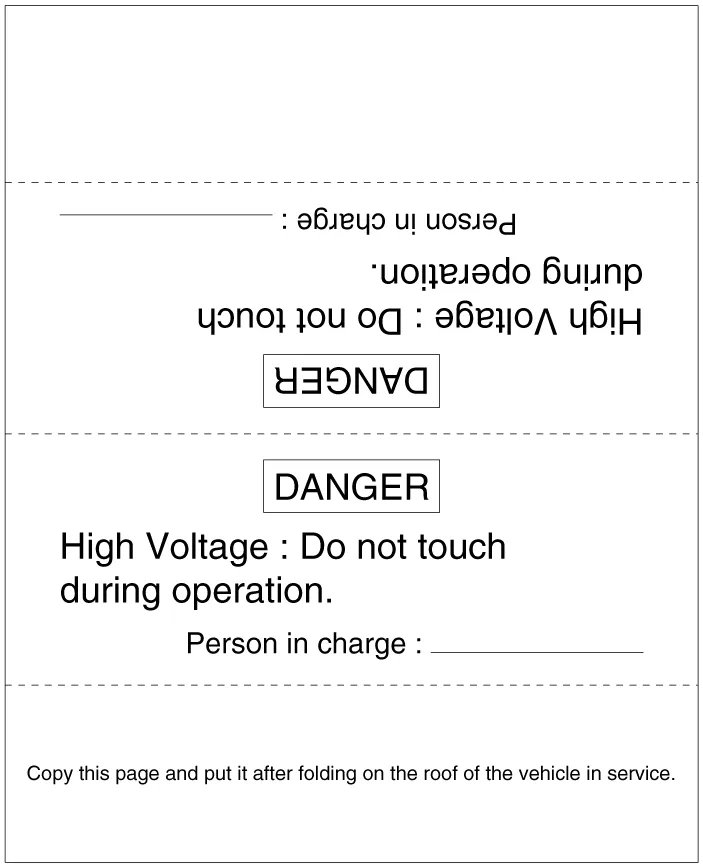
Personal Protective Equipment
Name
|
Illustration
|
Description
|
Insulation glove
| 
| Used when inspecting or working on the high voltage components
[Insulation performance : 1000V / 300A or above]
|
Insulation shoes
| 
| Used when inspecting or working on the high voltage components
|
Insulation clothes
| 
|
Insulation helmet
| 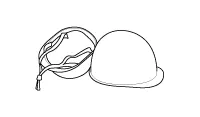
|
Safety glasses
| 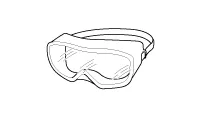
| Used in the case below
• During Removal & installation or inspection of the high voltage battery terminals or wiring, which spark might happen.
• During working on the high voltage battery pack assembly.
|
Face shield
| 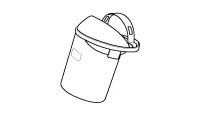
|
Insulation mat
| 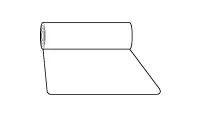
| Putting the removed high voltage components on the insulation mat to prevent safety accidents.
|
Insulation sheet
| 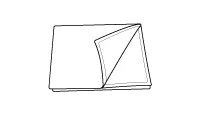
| Covering the high voltage components with insulation sheet to prevent people who don’t wear the personal protective equipment from safety accidents.
|
Precautions To Take When Handling Power Cable
| •
| Immediately insulate the high voltage terminal after reconnecting the terminal (use insulation tape). |
| •
| Tighten the high voltage terminal screw to spec torque. |
| •
| Be careful that (+) and (-) terminals do not come in contact when connecting or disconnecting power cable and busbar. |
|
Precautions To Take When Handling High Voltage Battery
| •
| When transporting high voltage battery, be sure to keep it flat and leveled. Failure to do so may decrease the battery performance and/or its life-span. |
| •
| High voltage battery's performance may decrease if it is exposed to high temperature for a lengthy period. As a result, heat-treatment after painting must not exceed 70°C/ 30 minutes, or 80°C/ 20 minutes. |
|
Precautions in case of fire on the high voltage battery system
| •
| Turn OFF the Start button. Keep the Smart Key at least 2 meters away from the vehicle to prevent unintended engine start. |
| •
| Quickly disconnect the service interlock connector plug in the early stage of fire. (Refer to Hybrid Control System - "High Voltage Shut-off Procedure") |
| •
| Turn OFF the vehicle key as soon as possible and evacuate to the outside if the vehicle stops after a flooding/collision accident. |
| •
| If a small fire occurs, use an extinguisher for electrical fire (ABC or BC) to extinguish. |
| •
| If the fire has not been put down in early stage, escape to the safe place and keep people out of the vehicle. |
| •
| Call fire station and report the vehicle is on fire. Follow the instruction from the fire station. | •
| If it is difficult to supress the fire, promptly move to safe place and wait until the rescue arrives. |
| •
| The fire on the drive motor battery at the bottom of the vehicle requires constant supply of a large volume of water to extinguish. It is difficult to extinguish the fire if there are not enough water or proper fire extinguisher. Approaching the vehicle may lead to life damage such as electrical shock. |
|
|
|
Precautions In Case Of High Voltage Battery Gas Or Electrolyte Leakage
| •
| Turn OFF the Start button. Keep the Smart Key at least 2 meters away from the vehicle to prevent unintended engine start. |
| •
| Gas is hydrogen and alkaline vapor. If the leakage is indoor, ventilate the area immediately and evacuate to a safe location. |
| •
| If the leaked liquid comes in contact with skin, immediately neutralize the affected area with boric acid solution, then clean with tap water or saline solution. |
| •
| If the leaked vapor or liquid gets in the eye, immediately clean the affected eye with water then get medical attention. |
| •
| If the gas leakage is caused by high temperature, then do NOT use the battery until the high voltage battery fully cools down to room temperature. |
|
Precautions When Handling The Vehicle After An Accident
| •
| Be sure to wear insulated gloves (or rubber gloves), protective goggles, insulated suite, and insulated boots. |
| •
| Do NOT touch bare cable under any condition. (Refer to "Precautions when handling power cable") |
| •
| If the vehicle is flooded, do not come close to the high voltage related parts. If the situation is unavoidable, move the vehicle to a safe place before taking action. |
| •
| Gas is hydrogen and alkaline vapor. If the leakage is indoor, ventilate the area immediately and evacuate to a safe location. |
| •
| If the leaked liquid comes in contact with skin, immediately neutralize the affected area with boric acid solution, then clean with tap water or saline solution. |
| •
| Refer to "High voltage cut-off procedure" if the high voltage needs to be cut off. |
|
Precaution for vehicle fire
If a small fire occurs, use an extinguisher for electrical fire (ABC or BC) to extinguish.
| •
| If the fire has not been put down in early stage, escape to the safe place and keep people out of the vehicle. |
| •
| Call fire station and report the vehicle is on fire. Follow the instruction from the fire station. | •
| If it is difficult to supress the fire, promptly move to safe place and wait until the rescue arrives. |
| •
| The fire on the drive motor battery at the bottom of the vehicle requires constant supply of a large volume of water to extinguish. It is difficult to extinguish the fire if there are not enough water or proper fire extinguisher. Approaching the vehicle may lead to life damage such as electrical shock. |
|
|
Preparations When Servicing The Accident Vehicle
| •
| Be sure to wear insulated gloves (or rubber gloves), protective goggles, insulated suite, and insulated boots. |
| •
| Boric Acid Power or Solution |
| •
| Towel for cleaning electrolyte |
| •
| Vinyl tape (for insulating terminal) |
| •
| Mega ohm tester (for checking high voltage) |
|
Precautions In Case HEV Is Left Unattended For A Lengthy Period
| •
| Turn OFF the Start button. Keep the Smart Key at least 2 meters away from the vehicle to prevent unintended engine start. |
| •
| We recommend that HEV is driven at least 1 time for over 30 minutes every 2 months to protect and manage the high voltage battery (inquire at relevant team in HMC). |
| •
| When inspecting or exchanging the auxiliary battery, check high voltage battery SOC reset related problems. |
|
Hybrid Vehicle Refrigerant Recovery / Charging Precautions
| •
| Since the electric compressor uses high-voltage, you should use POE oil which have high Volumetric Resistivity. |
| •
| Do not use the same A/C recovery / charging station as conventional belt-driven compressors. |
| •
| If the POE oil of the system gets mixed with PAG oil, then dielectric breakdown due to decreased volumetric Resistivity can occur and inoperative A/C compressor may result, A/C compressor may not work |
|
|
High Voltage Shut-off Procedures
•
Be sure to read and follow the "General Safety Information and Caution" before doing any work related with the high voltage system.
Other information:
System OverviewParking Distance Warning (PDW) is an electronic driving aid that warns the driver to be cautious while parking or driving at low speed. The sensor uses ultrasonic waves to detect objects within proximity of the vehicle.PDW consists of four RPS sensors which are detecting the obstacles and transmit the result separated into three war
Removal
•
Put on gloves to prevent hand injuries.
•
When removing with a flat-tip screwdriver or remover, wrap protective tape around the tools to prevent damage to components.














